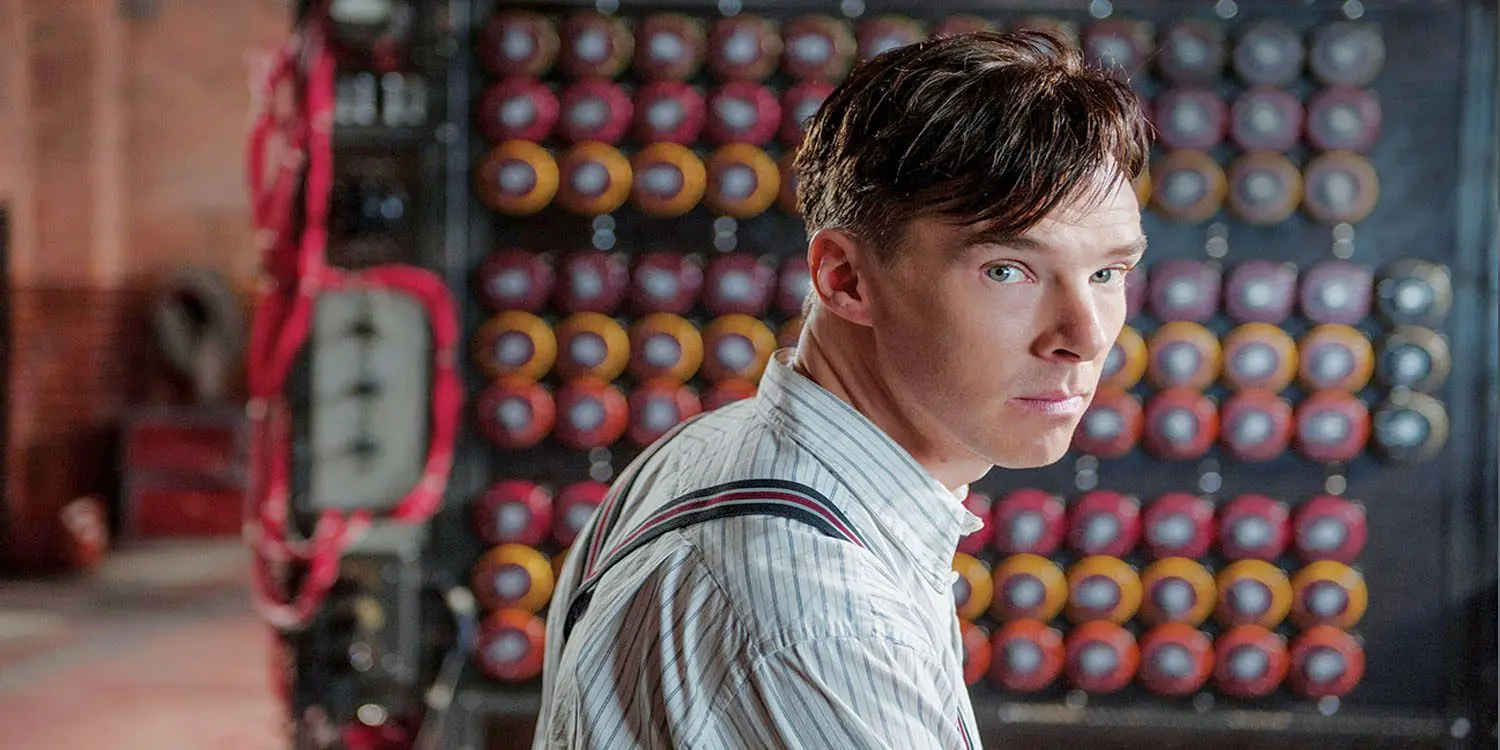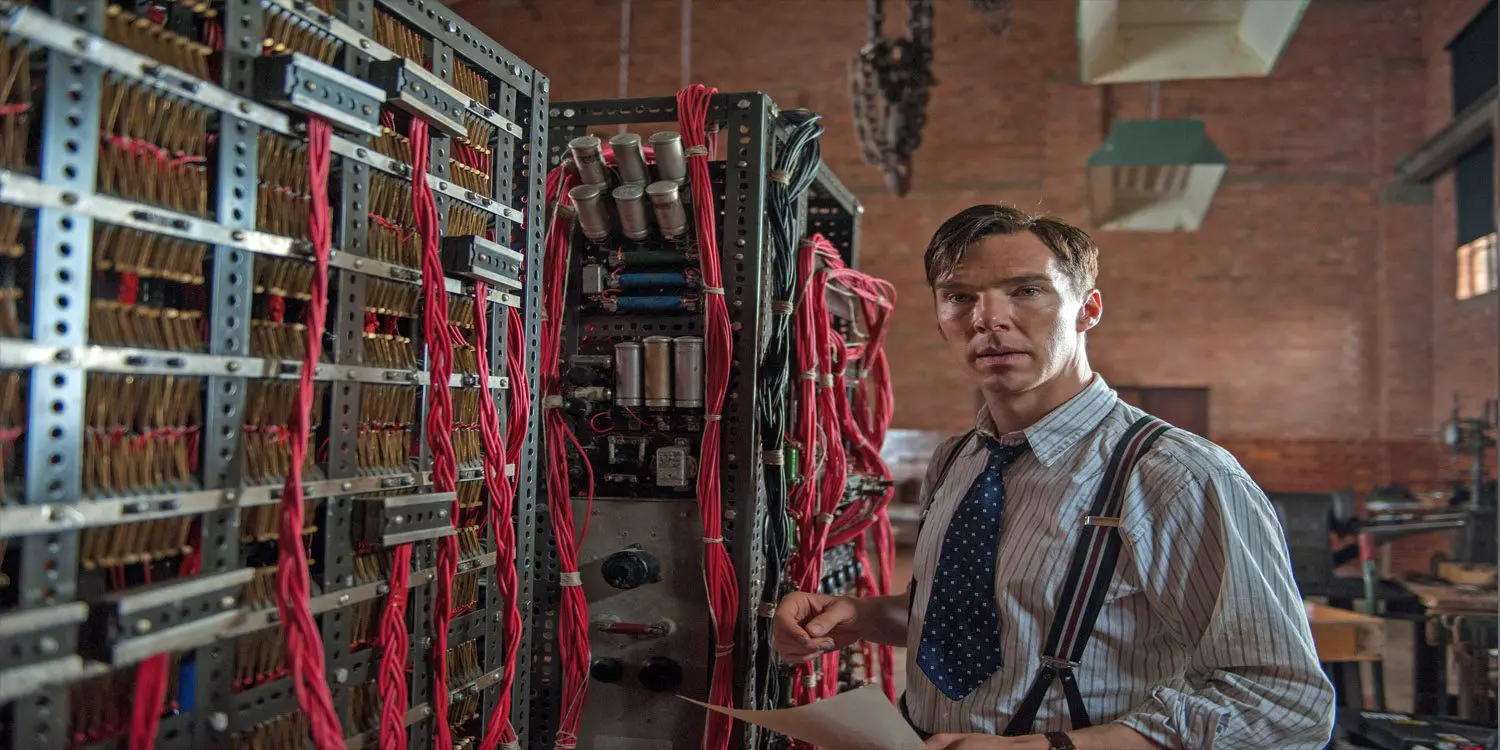For a movie about very smart people, The Imitation Game isn’t a particularly smart movie. Not that it’s necessarily a bad one; it has an excellent cast, and they lend the material respect and enthusiasm. But it’s certainly flawed, and perhaps enough that what works and what doesn’t will cancel each other out based on what you’re personally into.
It’s also, it must be said, a decidedly British movie. Morten Tyldum, the director, is a Norwegian, but the cast are about as British as it’s possible to get without actually choking on all the plums.
The Imitation Game Review and Plot Summary
Alan Turing, the mathematician upon whose biography the movie is (loosely) based, was a Brit. Bletchley Park, where most of the proceedings take place, was the nerve-centre of British code-breaking during the Second World War. Characters huff exasperated declarations, like “I’m leaving,” before making an exit, or, “By Jove, I’ve got it!” whenever they stumble across the solution to a particularly taxing problem.
I’m British, yet even I noticed how stuffy it feels when so many of my middle-to-upper-class countrymen are bundled into a single location. There’s a perpetual air of old-fashioned propriety and an almost obnoxious sense of prim-and-proper social superiority. It leaks out of the characters and bleeds into everything else. “We’re the best cryptographic minds in England,” one of Turing’s fellows insists. But of course you are. If only the movie would trust us to recognise that ourselves.
Alan Turing is generally considered the father of both computer science as a field and the computer itself, having built a machine for British intelligence which allowed the Allies to decrypt Nazi Germany’s previously-unbreakable communication system, Enigma.
That’s the story The Imitation Game is primarily interesting in telling, but it winds opportunistically in and out of three decades whenever it requires a framing device or some biographical explanation for Turing’s behaviour. That’s where most of the righteous pomposity comes from – Turing himself, who, as played by Benedict Cumberbatch, cuts a snooty, distinctly unlikeable figure throughout much of the movie.

Benedict Cumberbatch as Alan Turing in The Imitation Game (Credit to The Weinstein Company)
Of course, the less palatable aspects of Turing’s personality and life don’t exactly gel with the very specific message Tyldum is trying to impart, so many aspects are glossed over, omitted entirely or hastily justified in order to keep things on the right side of moral history.
Another member of the Bletchley whizz-kid team, Hugh Alexander (Matthew Goode, perhaps oxymoronically a womanizing chess champion) describes Turing’s neuroses as an “irascible genius routine”. After angling to get two members of the group fired for being intellectually inferior, Mark Strong, as the MI6 chief, asks of Turing, “Popular at school, were you?” No, of course not. So off we pop to 1928 for a thorough examination of why.
Turns out Turing was relentlessly tormented at boarding school for being socially clueless and impossibly fussy. He seeks solace in his bond with Christopher, the only young lad who finds him tolerable. Coincidentally, he also brings out Alan’s nascent homosexuality.
You never actually see Turing being gay, mind; there’s no weight to his sexuality, even though his sexual identity is inseparable from the achievements and tragedies of his life at this point. It’s even shamelessly used as a hook on which to hang a mediocre plot twist (which is also purely fiction).
The biggest reason to object to this time-hopping structure is that it’s somehow both the simplest way to tell this particular story, yet also utterly nonsensical. The movie opens with what one would assume is a framing device: Turing in an interrogation room, explaining to a Scottish detective (Rory Kinnear) the role he played in the war.
So the story winds back to the early 1940s, to Turing applying for a job at the Government Code and Cypher School. Occasionally, Turing jumps in as a voice-over to smooth over the chronological bumps; there are those scenes that explore his childhood and others that take place at various points throughout the entirety of World War II.
The logical assumption here would be that the story is all his retelling of events, yet every now and again we’re teleported to the police investigation which landed Turing in the interrogation room in the first place (the detective is looking into a burglary at Turing’s apartment, and thinks he could be a spy).
Toward the end, the movie actually catches up to the framing device and just continues plodding along from there.
The “message” I was referring to earlier is that there’s nothing more beautiful than a person’s special uniqueness, and that we should celebrate the odd folks in life as they’re the ones who do the truly amazing things.
There’s a particularly nauseating line which is ready-made for Tumblr memes: “Sometimes, it’s the people who nobody imagines anything of who do the things nobody can imagine”. Christopher says it first, to Turing, but for good measure it’s repeated by two more characters on two separate occasions before the end.
Yet the real message of Turing’s life is that no matter how many of those unimaginable things you do, if you’re different enough you’ll end up getting fucked over anyway.

The Imitation Game (Credit to The Weinstein Company)
Adult homosexuality was illegal in England until 1967. In 1952, Turing was convicted of gross indecency and sentenced to chemical castration. Two years later, professionally ruined, he took his own life by eating a cyanide-laced apple.
None of this is in the movie at all, other than being briefly acknowledged in a few cards of postscript that precede the closing credits. It’s shameless, for one thing, treating the method of his suicide as a fun little Easter egg by sprinkling hints and clues around the main body of the movie, but it’s also dramatically fraudulent.
Despite all this, The Imitation Game is better than it has any right to be based almost entirely on its cast. There are moments that, taken individually, are superior to the movie around them. Strong, for example, is far too good to allow the various instances in which he has to react to Turing’s oddness descend into silliness – even though he’s largely playing his foil (or what would be, in a different movie, the audience’s surrogate).
Keira Knightley almost derails the whole thing as the sole female member of the team; even though she isn’t given too much to actually work with, her character, Joan Clarke, is decidedly more interesting than most purely because of enforced gender roles.
Her family consider the all-male environs of Bletchley Park to be, in their words, “indecorous” (perhaps the most British word of all time), and so she’s forced to pose as a secretary, sneak around the base to work on the codes, and ultimately marry Turing himself lest she be lost to the horrors of plain old domestication.
These developments get a by-the-book treatment, but Knightley is good enough to make the character work. She could have carried a different version of this movie on her own.
Benedict Cumberbatch’s Impact in The Imitation Game
Ultimately though, it’s up to Cumberbatch to sustain our interest. After seeing him play Sherlock Holmes in the BBC’s adaptation of Arthur Conan Doyle’s famous detective, and after seeing his work here, I’m convinced that nobody else in the business today can convey a sense of emotional-detachment and cold logic better than him.
His performance is stuffed with physical and verbal tics, yet never quite slips into clichéd autistic mannerisms. He undercuts Turing’s brusqueness and literalising with innocence, and a sweetness which in some cases its odd the other characters don’t notice.
Every level on which The Imitation Game works does so because of him. He looks the part, too. Very few Hollywood stars can embody the reclusive turtleneck-wearer. Cumberbatch, with his newt’s-belly complexion, wears the role as snugly as the sweater.
Are the performances enough to distract from such a punch-pulling format? For some people, yes, perhaps. For others, I doubt it. This is Tyldum’s first Hollywood movie, and his weak hand on the tiller steers it far closer to crowd-pleasing tedium than you might have expected from the guy who made 2011’s Headhunters.
The Imitation Game is a movie made with skill, and backed up by fine, awards-worthy performances, but it’s one which also lacks the courage to truly engage with the tragic side of Alan Turing’s story.
RELATED:




